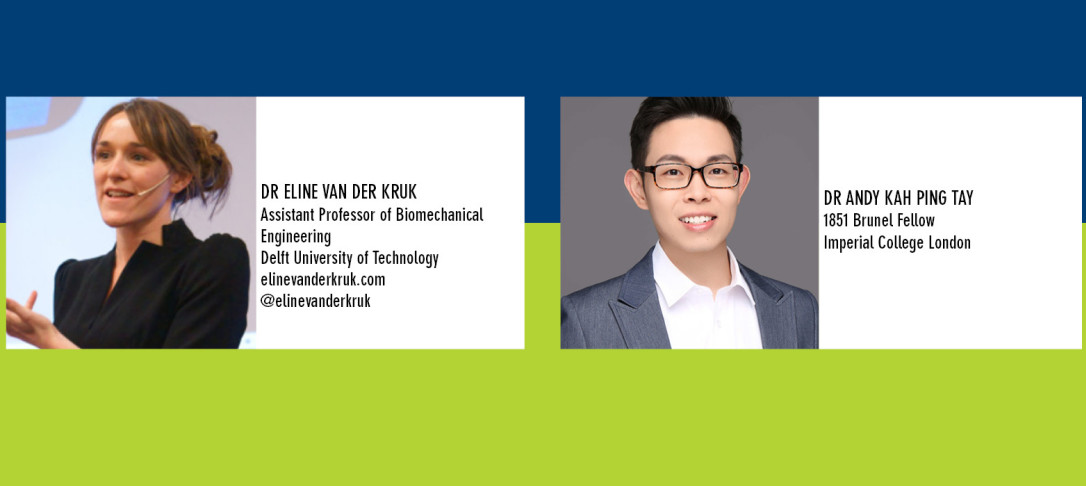
Catch up on this Bioengineering Department Seminar on our YouTube channel: Click here to watch
DR ANDY KAH PING TAY
Talk title: How lessons from online shopping can benefit cancer therapy
Talk abstract: Online shopping is great! But certainly, not the myriad of delivery options with different companies, prices, and efficiency. When we choose a delivery service for our online purchases, we want a service that is efficient, timely and does not damage our goods. This is the same when we try to deliver DNA into immune cells to engineer them for Chimeric Antigen Receptor T cell (CAR-T) therapy. In this talk, I will discuss a novel DNA delivery integrating nano-scale fabrication with electrical and magnetic modalities that offers 2-4x higher efficiency than gold-standard virus and bulk electroporation DNA delivery method and is minimally perturbative to critical biological attributes of cells.
Biography: Andy Tay graduated in 2014 from the National University of Singapore (NUS) with a First-Class Honors in Biomedical Engineering. He later graduated with his PhD from the University of California, Los Angeles in 2017. His thesis on non-invasive neural modulation won the Springer Thesis Award. Andy received his postdoctoral training at Stanford University before heading to Imperial College London as the 1851 Royal Commission Brunel Research Fellow. He will be setting up his lab focusing on multi-scale immuno-engineering in early 2021.
Andy has received multiple international awards including the prestigious Helmsley Fellowship (Cold Spring Harbor Laboratory), Bavaria California Technology Center grant, Toshihiko Tokizane Memorial Award for Excellent Graduate Study in Neuroscience, Endeavour Research Fellowship and 1851 Royal Commission Brunel Fellowship. He is a 2019 Forbes 30 Under 30 (US/Canada, Science) and World Economic Forum Young Scientist Class of 2020.
DR ELINE VAN DER KRUK:
Talk title: What moves us? Predicting age-related mobility impairments
Talk abstract: There are several reasons why our (neuro)musculoskeletal (NMSK) capacity, that is the ability of our muscles, bones, joints and associated tissues, could decline: accelerated as a result of neuromuscular diseases, at a normal rate due to healthy ageing, or temporarily due to fatigue. It is not yet understood how much decline can be tolerated before movement limitations begin; this lack of knowledge limits early intervention in musculoskeletal conditions. The onset of deterioration of (neuro)musculoskeletal capacity usually goes unnoticed, as our bodies can initially compensate for the loss of capacity. These compensation strategies are likely to onset with altered muscle recruitment and later, changes may be observed in movement patterns (kinematics). With experimental set-ups and predictive neuromuscular simulations, we try to understand when and how we compensate during our daily life activities and try to answer the question: what moves us?
Biography: Eline van der Kruk graduated as ‘first sports engineer in the Netherlands’ in 2013 from Delft University of Technology. In 2018 she received her PhD with distinction at the department Biomechanical Engineering with her innovative research on speed skating. She used predictive biomechanical models and built instrumented skates to find the ideal speed skating movement for the Dutch national speed skating team. She was nominated ‘Best Female PhD graduate 2018’ by the Delft Women in Science society. After her PhD, she moved to London for 2 years to continue her research on predictive modelling at Imperial College London on an NWO Rubicon grant. The focus of her research was here on predicting age-related movement limitations. This year (2020) she received both a Delft Technology Fellowship and an NWO Veni personal grant to start her own research group at the Biomechanical Engineering department of the TU Delft. Eline is a science communication enthusiast, she has been involved in several theatre shows, short documentaries, and public lectures.



